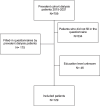Educational level and gender are associated with emotional well-being in a cohort of Dutch dialysis patients
- PMID: 38778249
- PMCID: PMC11112868
- DOI: 10.1186/s12882-024-03617-8
Educational level and gender are associated with emotional well-being in a cohort of Dutch dialysis patients
Abstract
Background: Patients undergoing dialysis have an impaired health-related quality of life (HRQOL). There are conflicting data from small series on whether patient-related factors such as educational level have an impact on experienced HRQOL. The aim of this study was to investigate the association between educational level and HRQOL in dialysis patients.
Methods: In a single-center retrospective cross-sectional study HRQOL was measured using the Kidney Disease Quality of Life Short Form-36 (KDQOL-SF36) in prevalent chronic dialysis patients. Educational level was categorized into low, intermediate and high subgroups. Univariate and multivariate regression analyses were performed to assess the effects of age, gender, ethnicity, and dialysis vintage on the association between HRQOL and educational level.
Results: One hundred twenty-nine chronic dialysis patients were included. Patients with an intermediate educational level had significantly higher odds of a higher emotional well-being than patients with a low educational level 4.37 (1.-89-10.13). A similar trend was found for a high educational level (OR 4.13 (1.04-16.42), p = 0.044) The odds for women compared to men were 2.83 (1.32-6.06) for better general health and 2.59 (1.15-5,84) for emotional well-being. There was no interaction between gender and educational level for both subdomains. Each year of increasing age significantly decreased physical functioning (OR 0.94 (0.91-0.97)).
Conclusions: Educational level and sex were associated with emotional well-being, since patients with intermediate and high educational level and females had better emotional well-being in comparison to patients with low educational level and males. Physical functioning decreased with increasing age.
Keywords: Dialysis; Educational level; Health-related quality of life.
© 2024. The Author(s).
Conflict of interest statement
The authors declare no competing interests.
Figures
References
-
- Verberne WR, et al. Development of an International Standard Set of Value-Based Outcome Measures for Patients With Chronic Kidney Disease: A Report of the International Consortium for Health Outcomes Measurement (ICHOM) CKD Working Group. Am J Kidney Dis. 2019;73(3):372–384. doi: 10.1053/j.ajkd.2018.10.007. - DOI - PubMed
MeSH terms
LinkOut - more resources
Full Text Sources
Medical


